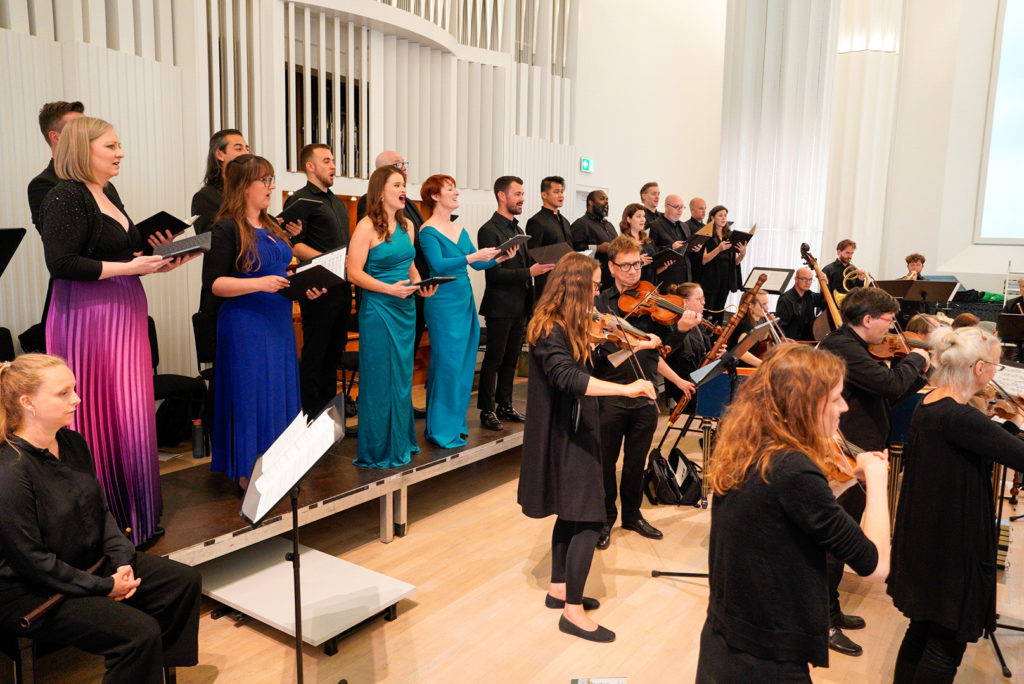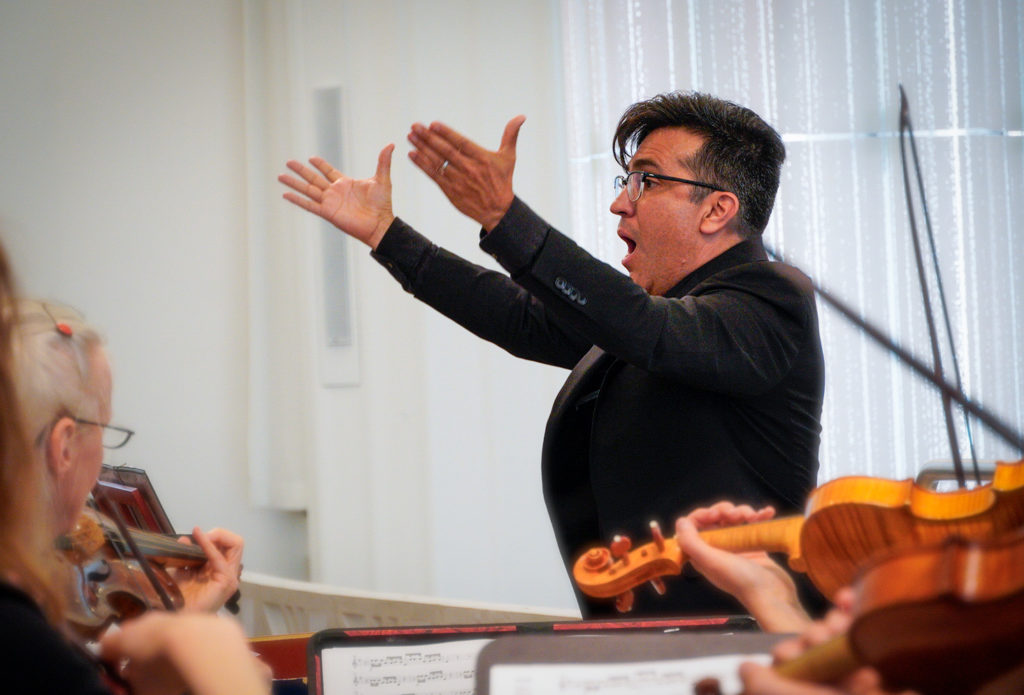Bach Collegium San Diego Makes A Stunning Debut at Leipzig’s Annual Bach Festival
The Bach Collegium San Diego made its auspicious European debut Tuesday at Bachfest Leipzig 2024 with a concert of three festive J.S. Bach cantatas performed in the Leipzig University Church of St. Paul. Now in its 25th season, this eleven-day festival devoted to the choral music of J. S. Bach invites choirs from around the globe to participate in its almost nonstop daily marathon of concerts in the city’s various churches.
Even casual students of music history can recall that J.S. Bach spent most of his career composing music and directing the music for worship in this prosperous Central German city. Although Bach is most closely associated with Leipzig’s historic Thomaskirche and its residential choir school, he oversaw the preparation and performance of the music in all of city’s churches from 1723 to 1750.So it is appropriate that the entire city of contemporary Leipzig is pulsing with Bach’s music during its annual Bachfest, and its churches are kept open day and night hosting this ambitious musical celebration that will present some 50 sacred cantatas by J. S. Bach. The United States is well-represented in this year’s choral programming, and on Monday I was able to hear Pennsylvania’s Bach Choir of Bethlehem—the oldest Bach choir in North America—present its concert in the Thomaskirche.
In early May, the Bach Collegium San Diego presented its three Bachfest cantatas in a pair of concerts in Point Loma and La Jolla, but its Leipzig concert was slightly different inasmuch as Artistic Director Ruben Valenzuela took only the vocal component of his Bach Collegium to Germany. Under his direction on Tuesday, his singers were complemented by the Pauliner Barockensemble, a period instrument ensemble based in Leipzig’s University Church.Under Valenzuela’s vibrant direction, the Bach Collegium’s account of Bach’s cantata Gelobet seist du, Jesu Christ, BWV 91, thrilled the 700 members in the University Church audience. Written for the celebration of Christmas Day in 1724 Leipzig, the cantata’s opening chorus is powered by exultant brass and timpani that the Bach Collegium choristers matched with their robust yet disciplined choral sonority. A procession of virtuoso vocal soloists built on the excitement of that opening movement: Clara Rottsolk’s bright soprano and spirited declamation generously filled the spacious University Church in her aria, as did Enrico Lagasca’s dramatic, hearty baritone in his. Tenor Aaron Sheehan deftly navigated his aria’s dense counterpoint, while Clara Rottsolk and countertenor Reginald Mobley fused their shimmering voices in a duet graced by their telling dynamic shading. Bach’s unusually elaborate closing chorale stanza brought back the rich orchestration of the opening chorus.
Because J. S. Bach wrote numerous elaborate organ preludes based on the familiar Lutheran Advent chorale “Nun komm, der Heiden Heiland” (“Savior of the Nations, Come”), we can safely assume that had a special attraction to that hymn. His 1714 cantata “Nun komm, der Heiden Heiland,” BWV 61 is frequently presented in North American churches, but his later cantata on this Advent chorale from 1724, BWV 62, is rarely heard, so it was rewarding to experience the Bach Collegium’s account of this cantata a second time.

Bach Collegium singers & Leipzig instrumentalists in University Church Gallery [photo (c.) Gary Payne]
Another 1724 Bach cantata to celebrate Christmas, Christum wir sollen loben schon, BWV 121, is rarely heard in North America, and clearly one of the advantages of Leipzig’s Bachfest is its presentation of the lesser known gems of the J. S. Bach canon. Martin Luther based his German chorale “Christum wir sollen loben schon” on the ancient Gregorian Latin hymn “A solis ortus cardine,” and even though Bach has treated the chorale to his usual luxurious late Baroque tonal harmonic vocabulary, the chorale and the cantata’s opening chorus still retain the darker, modal color of the original Gregorian hymn. Indeed, the dense imitative counterpoint of the opening chorus evokes a Renaissance motet, which the Bach Collegium singers communicated with their dependably precise, elegant phrasing. Other delights of the cantata included Tipton’s command of the exuberant figuration in his bass aria, the grace of Carter’s suave recitative, and the poignant oboe d’amore descant in the tenor aria.
Each cantata was preceded a J. S. Bach organ solo on the chorale theme of each cantata performed by Daniel Beilschmidt, the Leipzig University Organist. I was particularly impressed with his masterful account of “Nun komm, der Heiden Heiland,” BWV 660, one of the three settings of this chorale in Bach’s collection of chorale preludes we call The Great Eighteen Chorale Preludes. Beilschmidt delivered the bristling lines of this mighty trio with unusual authority and conviction.
This concert was presented by the Bach Collegium San Diego in Leipzig’s Paulinum, the University Church of St. Paul, on Tuesday, June 11, 2024, as part of the Bachfest Leipzig 2024.

Ken Herman, a classically trained pianist and organist, has covered music for the San Diego Union, the Los Angeles Times’ San Diego Edition, and for sandiego.com. He has won numerous awards, including first place for Live Performance and Opera Reviews in the 2017, the 2018, and the 2019 Excellence in Journalism Awards competition held by the San Diego Press Club. A Chicago native, he came to San Diego to pursue a graduate degree and stayed.Read more…



A great honor to be invited to perform for this internationally-acclaim festival.
True, and they did San Diego proud with a stunning performance. The audience ovation at the end was lengthy and vociferous!
I have always loved Bach’s instrumental music and am a relative newcomer to the joys of his choral contributions. However Ken Herman has successfully employed every adjective I could think of personally to express my own reaction to the experience of being one of the fortunate 700 audience members at Monday’s Bachfest concert in Leipzig: breathtaking, gripping, vivid, glowing, elegant, and stunning. Thank you San Diego Bach Collegium!
Incredibly beautifully performed, and what a gift to have actually be there! I am so proud of BCSD and their hard work…to be invited to the Leipzig Bach Fest and organize it all was truly a stunning accomplishment; we San Diegans are so proud of the many gifts and talents of our extended community!